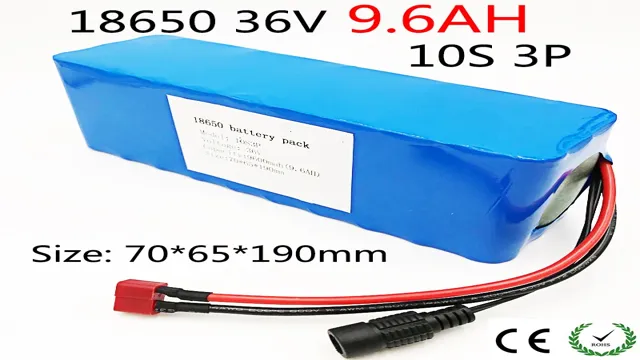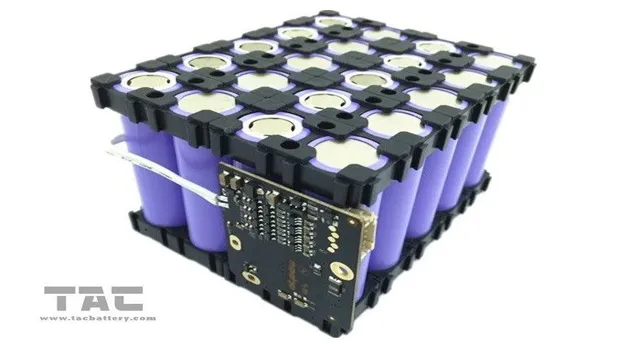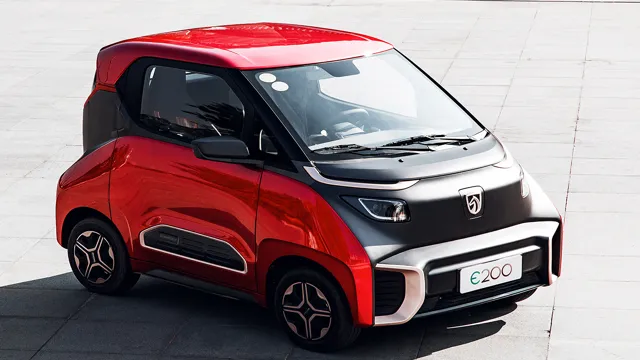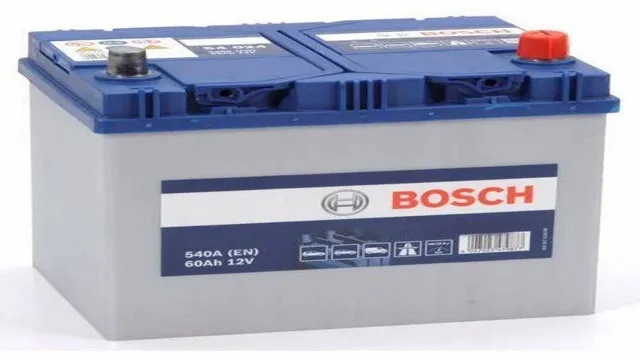Revving Up the Future: Exploring the Power of Electric Car Batteries with 18650 Cells
Electric vehicles have been gaining popularity in recent years due to their energy efficiency and eco-friendliness. One crucial component of an electric car is its battery which powers the vehicle’s entire system. The batteries used in electric cars are mostly made up of thousands of small 18650 lithium-ion cells, which are commonly used in laptops, power tools, and other electronic devices.
In this article, we will dive deep into everything you need to know about electric car battery 18650. Firstly, we will explore the history of electric car batteries and explain why the 18650 cell has become a popular choice for electric car manufacturers. Then, we will discuss the technical specifications of the 18650 cell, such as its voltage and capacity, and how it affects the overall performance of the battery.
Additionally, we will cover how these batteries are manufactured and what makes them different from other battery types. Furthermore, we will delve into the advantages and disadvantages of using the 18650 cell in electric car batteries. We will discuss the benefits of its high energy density, long lifespan, and low self-discharge rate.
On the other hand, we will also cover its limitations, such as its limited power output, lower overall efficiency, and the possibility of thermal runaway. Moreover, we will touch upon some exciting developments in the field of electric car batteries, including the ongoing advancements in battery technology, the potential for solid-state batteries, and how they could revolutionize the industry. In conclusion, this article aims to provide a comprehensive overview of everything you need to know about electric car battery 18650.
Whether you are an electric car owner, enthusiast, or simply interested in the technology behind these modern vehicles, this article will serve as a valuable resource for answering all your battery-related questions.
What are 18650 batteries?
Electric car battery 18650 refers to the cylindrical lithium-ion battery cells that are widely used by automakers for their electric and hybrid vehicles. These batteries are named after their dimensions, which are 18 mm in diameter and 65 mm in length. While they were originally designed for the consumer electronics industry, they have become a popular choice for electric cars due to their high energy density and relatively low cost.
Additionally, 18650 batteries are known for their durability and long cycle life, making them a reliable choice for powering electric vehicles. In fact, Tesla has been a big proponent of 18650 batteries, even using them in their early Model S vehicles before switching to larger battery cells. With the growing popularity of electric vehicles, the demand for 18650 batteries is also on the rise, inspiring manufacturers to produce higher quality and more efficient cells.
Origin and Composition
18650 batteries are small and powerful rechargeable lithium-ion batteries that have become increasingly popular in recent years. These batteries get their name from their size; they are cylindrical and measure 18 mm in diameter and 65 mm in length. Originally developed for use in laptops, these batteries are now commonly used in a wide variety of consumer electronics, such as flashlights, cordless drills, and even electric vehicles.
They are also popular among hobbyists and DIY enthusiasts who use them to power their projects. 18650 batteries are composed of a positive and negative electrode, a separator, and an electrolyte. The positive electrode is made of lithium cobalt oxide, while the negative electrode is typically made of graphite.
The separator is a thin layer of material that keeps the positive and negative electrodes from touching, while the electrolyte is a liquid or gel substance that allows the movement of ions between the electrodes. With their high energy density and long lifespan, 18650 batteries offer a reliable and efficient power source for a range of applications.

Features and Functionality
18650 batteries are a type of lithium-ion rechargeable battery that has become a popular power source in many different applications. These batteries are named after their size, measuring 18mm in diameter and 65mm in length. They are known for their high energy density, long lifespan, and ability to deliver consistent power.
These features make 18650 batteries a popular choice for use in high-drain devices such as flashlights, laptops, and electric vehicles. With their compact size and powerful performance, it’s easy to see why these batteries have become a go-to solution for many different power needs. If you’re in need of a reliable and efficient power source, 18650 batteries may be just what you need.
Why are 18650 batteries used in Electric Cars?
Electric cars are powered by rechargeable batteries that provide the necessary energy for their electric motor to function. One of the most commonly used types of batteries for electric cars is the 18650 battery. These batteries, named for their dimensions of 18mm by 65mm, were originally designed for use in laptops and other electronic devices.
However, they have become popular for use in electric cars due to their high energy density, long cycle life, and relatively small size. The 18650 battery is made up of lithium-ion cells that store and release electrical energy as needed to power the car. These batteries are known for their durability and reliability, making them a popular choice for use in electric cars and other applications where a long-lasting, high-performance battery is required.
Overall, the use of 18650 batteries in electric cars has helped to improve the range, efficiency, and reliability of these vehicles, helping to accelerate the adoption of green transportation.
Energy and Power
Electric car manufacturers prefer using 18650 batteries due to their high energy density and excellent performance. These lithium-ion batteries contain several cells, each offering a nominal voltage of 7 volts.
Hence, by connecting several cells in series and parallel configurations, manufacturers can customize the battery packs to fit specific electric car models. 18650 batteries can handle high discharge rates and provide significant power capacity, which is essential for electric vehicles. They also have a longer lifespan and better thermal stability than other battery types, making them ideal for use in electric cars.
In addition, their small size allows for more flexibility in the design of electric cars and their battery packs. Furthermore, using 18650 batteries in electric cars reduces the cost of production while providing superior battery efficiency and safety. Overall, 18650 batteries offer an excellent balance of power capacity, energy density, and thermal stability, making them the perfect choice for powering electric cars.
Safety and Reliability
Electric cars are becoming increasingly popular with each passing day. As a result, the demand for high-quality batteries that can power them is also on the rise. One battery that has gained immense popularity in this regard is the 18650 battery.
These batteries are used in electric cars due to their excellent safety and reliability properties. Electric cars demand a high level of safety and reliability, and this is where the 18650 batteries excel. They are designed to be durable, long-lasting, and safe to use.
That is why many electric car manufacturers opt for these batteries. Additionally, 18650 batteries are known for their high energy density, which allows them to provide excellent performance, making them ideal for use in electric cars. All in all, the versatility and efficacy of these batteries make them an excellent choice for use in electric vehicles.
Benefits of Electric Car Battery 18650
Electric car batteries come in various shapes and sizes, but one of the most widely-used and popular types is the 18650 battery. There are several benefits of electric car batteries 18650. Firstly, they are small and lightweight, making them ideal for use in electric cars where space and weight are major concerns.
Secondly, they are highly efficient and provide a high level of energy density, which means that they can power electric cars for longer distances without needing to be recharged. Thirdly, they have a long lifespan, which reduces the need for frequent replacements, saving money and reducing waste. Lastly, they are much safer than traditional car batteries as they are less prone to catching fire or exploding.
All in all, the 18650 electric car battery is a reliable, cost-effective, and environmentally-friendly option for powering electric vehicles.
Long Lifespan and Durability
Electric car batteries utilizing the 18650 cell have a plethora of benefits, one of which is their long lifespan and durability. Unlike traditional car batteries, the 18650 cell battery is known for its robustness as it has been utilized in electronic devices for years, and is proven to be dependable. These batteries can withstand numerous charging cycles without losing their capacity for power, making them an ideal choice for vehicles that need a longer battery lifetime.
The 18650 cell batteries in electric cars also have a low self-discharge rate, which means that they can sit for an extended period without losing their charge. Moreover, these batteries are resistant to shocks and vibrations, making them well-suited, even in extreme weather conditions. Electric car owners can enjoy long-lasting, reliable battery life, and lower overall costs since they don’t need frequent replacement, thanks to the 18650 cells’ durability.
High Energy Density and Efficiency
Electric car batteries that use 18650 cylindrical cells have revolutionized the way we travel and reduced our carbon footprint. One of the major benefits of these batteries is their high energy density, meaning they can store more energy in a smaller space compared to other battery types. This allows electric cars to travel longer distances without the need for frequent charging and makes them much more convenient for everyday use.
In addition to this, 18650 batteries have a high efficiency rating, which means they can convert more of the energy stored in them into power for the electric motor. This leads to faster acceleration and more responsive driving, making electric cars a viable option for those who want a fun and engaging driving experience. Overall, the benefits of using electric car batteries with 18650 cells make them a smart and sustainable choice for the future of transportation.
How to Choose and Maintain 18650 Batteries for Your Electric Car?
Choosing and maintaining 18650 batteries for your electric car is an essential part of keeping your car running efficiently. When selecting an 18650 battery, it is important to consider factors such as the capacity, voltage, and type of cell. The capacity of the battery determines how long your electric car can drive on a single charge.
The voltage of the battery is another important consideration as it determines the speed at which your car can go. The type of cell used in the battery also affects the overall performance of the battery. Lithium-ion cells are the preferred choice due to their high energy density and low discharge rates.
Maintaining your electric car battery is also crucial for longevity and efficiency. Regularly charging your battery at the recommended rate and voltage is necessary to ensure optimal performance. It is also essential to keep your battery at the recommended temperature range and avoid overcharging or undercharging.
By following these guidelines and selecting the right 18650 battery, you can enjoy a smoother, energy-efficient ride in your electric car.
Capacity and Voltage
When it comes to choosing and maintaining 18650 batteries for your electric car, it’s important to consider both capacity and voltage. Capacity refers to how much energy the battery can store, while voltage is the amount of electrical potential it can generate. Ideally, you want a battery with a high capacity and voltage, as this will allow for longer range and better performance.
However, it’s important to remember that these factors can also affect battery lifespan, so it’s crucial to find a balance that meets your needs without putting undue strain on the battery. Additionally, proper maintenance – such as regular charging and avoiding extreme temperatures – can help extend the life of your 18650 batteries, ensuring your car stays powered up for years to come. So, take your time and choose wisely – your electric car will thank you for it!
Charging and Discharging
When it comes to powering your electric car, choosing the right 18650 battery is critical. These lithium-ion batteries are popular for their high energy density and long lifespan. However, you need to take into account the charging and discharging rate of the battery before purchasing it.
If you plan to use your electric car for long-distance travel, you need a battery with a high charging and discharging rate to ensure that it can handle the increased demand. Additionally, you need to maintain your battery properly by following the manufacturer’s recommendations for charging and discharging. Overcharging or over-discharging your battery can lead to reduced performance and even damage the battery.
So, it’s important to choose the right battery and maintain it properly to ensure your electric car runs smoothly.
Storage and Safety Tips
Choosing and maintaining 18650 batteries for your electric car is of utmost importance for both the vehicle’s safety and performance. When selecting the right type of battery, it’s vital to consider capacity, voltage, and discharge rate. Lithium-ion batteries are the best choice due to their high energy density and long lifespan.
However, maintenance is also crucial. It’s imperative to store batteries at room temperature and avoid exposing them to extreme hot or cold temperatures. The batteries should also be charged using appropriate charging equipment to prevent overcharging or undercharging, which can lead to thermal runaway and ultimately, an explosion.
Keeping batteries well-maintained and ensuring they are appropriately used can give electric car owners peace of mind and reliable performance on the road.
Conclusion: 18650 Batteries – The Powerhouse Behind Electric Cars
In conclusion, the 18650 battery has revolutionized the world of electric cars. This compact and powerful battery not only provides longer ranges for electric vehicles but also offers a sustainable and eco-friendly alternative to traditional gasoline-powered cars. It’s amazing to think that the same batteries used in our handheld devices are now powering our transportation.
So, the next time someone asks what makes electric cars tick, you can confidently tell them it’s all thanks to the mighty 18650 battery!”
FAQs
What is an 18650 battery?
An 18650 battery is a type of lithium-ion battery commonly used in electric cars, laptops, and other electronic devices.
Why are 18650 batteries popular for electric cars?
18650 batteries are popular for electric cars because they offer a high energy density, meaning they can store a lot of energy in a small package. They are also durable and have a long lifespan.
How long does an 18650 battery last in an electric car?
The lifespan of an 18650 battery in an electric car depends on a variety of factors, including usage, temperature, and charging habits. However, they typically last between 5-10 years or around 1,000 charging cycles.
How are 18650 batteries recycled in electric cars?
When electric car batteries reach the end of their lifespan, the 18650 batteries are typically removed and recycled. The recycling process involves breaking down the battery into its component parts, such as metal and plastic, which can then be reused in other products.






